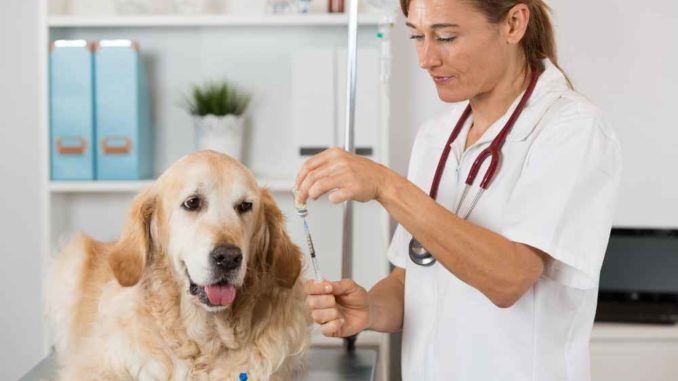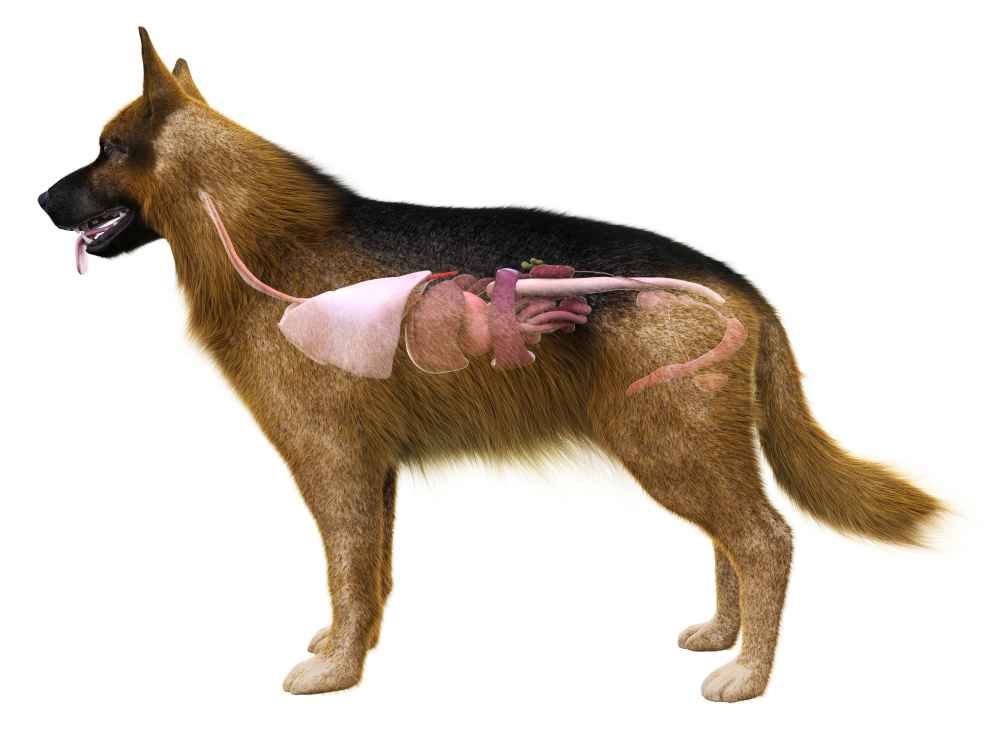
Stomach inflammation in dogs
Among human diseases, stomach bloat is one of the most common diseases. However, the same picture is observed in our friends of four legs – inflammation of the mucous membrane of the surface of the stomach is again in the foreground. As in humans, stomach bloat in dogs causes some unpleasant symptoms, can lead to complications and requires compulsory treatment.
Causes of stomach bloat in dogs
The causes of inflammation in dogs are not different from humans, except for the use of alcohol and smoking. If people have the most common cause of Helicobacter pylori disease, what causes stomach bloat in dogs? The main factors that act as triggers for these diseases are:

Lack of commitment to diet, poor quality, or monotonous food – according to statistics, dogs that eat cheap dry portions that do not meet the needs of the animal are more likely to suffer from stomach bloat ;
Eating food that is not appropriate for a dog’s diet – sausages, sausages, sweets, smoked meats, and other goodies are very harmful to dogs;
Worm infection – the larvae of some parasites live on the surface of the mucous membranes of the stomach, stick to it, and release toxic substances that irritate the surface of the body;
Allergic reactions.
Dental diseases and their treatment – often these diseases are accompanied by a stiff pain syndrome, which leads to the production of glucocorticosteroids, which in turn leads to an increase in pathological processes in the stomach, and the same happens when the patient treats teeth without anesthesia;
Endocrine disorder
Other diseases in a chronic form;
Use some medications.
Acute inflammation can occur after an animal has eaten old food, recovered, or swallowed a foreign body. Also, a factor is treatment with non-steroidal medications. Often there is secondary stomach bloat, which develops against the background of other pathological conditions, such as liver disease.
Older animals that suffer from tooth pain, or wholly or partially lack it, suffer from chronic inflammation. The reason for this condition is its inability to chew food well, as the dog swallows large chunks. Pet stomach bloat can “win,” which is fed with heat or on the contrary, excessive cold food.
Dogs with long hair, stomach bloat is often diagnosed compared to their short-hair counterparts, which is why – in their stomach, they often get congested wool, chunks of undigested food. This regular irritation of mucous tissues can cause surface damage and the development of inflammation.
In danger, there are malnourished pets that eat different types of garbage, including not always edible. Foreign bodies entering the stomach may cause stomach bloat.
Symptoms of stomach bloat in dogs
More pronounced symptoms accompany the acute form of the disease, it develops quickly, and it is easy for the owner to understand that his pet is sick. Chronic stomach bloat is slow, and its signs may not be very noticeable or smeared.
Symptoms can occur once, but most often, only some are observed. The main manifestations of gastric mucositis are as follows:
Stomach pain – almost always happens during stomach bloat. If the pain is severe, the dog starts to moan, palpation (palpation) of the peritoneum, and can be significantly enhanced.
Refuse to eat or reduce appetite – the dog may never touch food or leave most of it in the bowl;
Significant decrease in activity – a pet reluctantly goes for a walk, rejects games and other interactions, does not follow orders; always strives for retirement, and upon lying down, this position does not change in practice;
Violation of the act of defecation – with an increase in acidity of the stomach juice of the patient suffering from constipation, with reduced diarrhea; if the stool becomes dark, then we are talking about bleeding in the stomach;
Nausea, silencing arises – the content of the abdomen may have mucous or bloody impurities;
The surface of the tongue is covered with white plum.
Acute stomach bloat may be accompanied by severe thirst, abundant salivation (drooling), signs of dehydration. Often, the patient has a fever, with a chronic disease of these symptoms is not.
Treatment stomach bloat in dogs
There are many forms and types of the disease, characterized by an increase or decrease in the acidity of gastric juice. This, to no small extent, necessitates a mandatory visit to the veterinary clinic. Only a doctor based on the results of the tests can prescribe an appropriate treatment.
Primary care for acute stomach bloat includes the following activities:
On the first day, the animal is advised to starve.
It is prescribed to wash the stomach, but without medications that cause vomiting;
After a two-day hunger strike, pets should be given a broth of mucous rice or oatmeal, and a raw chicken egg can be added, then other products are introduced gradually;
If signs of dehydration are revealed, the dog is given droppings with brine, glucose solution, etc.;
When a dog has diarrhea, it includes the use of stabilizers in treatment, and constipation – laxatives;
Make enemas with a warm liquid, until the secreted fluid becomes clear, without pathological impurities;
To relieve pain from the four-legged patient, the veterinarian prescribes drugs with anesthetic and antispasmodic effect;
Antibiotic therapy – carried out if the analysis reveals the presence of pathogenic bacteria or infectious pathogens.
In the event of stomach bloat in any way, the mucous membrane of the affected organ suffers; it needs protection and recovery. For these purposes
If the inflammation is caused by helminth infestation, it is necessary first and foremost to perform de-worming and to rescue the dog from uninvited guests. Only after that, they continue to treat stomach bloat. In some cases, animals suffering from stomach bloat go to the veterinarian if exhausted. Then mineral vitamin complexes are also described.
Diet for stomach bloat
Inflammation of the stomach requires mandatory compliance with the diet, and this applies to both people and pets:
When feeding a dog, you must stick to the regime;
Initially, it is better to give the mucous pet meals a consistency pie, it is recommended to cut the meat, and cut the vegetables into a state of mashed potatoes.
As the ready-made rations increase, it is advisable to refuse and consult the veterinarian about this matter – often, the owners have to transfer the dog to other specialized rations or natural food.
The ban includes the following products that can cause exacerbation of the disease:
the milk.
Prickly vegetables – radish, onion, garlic, radish and dishes with them;
Vegetables and fruits in raw form, which are the sources of coarse fibers;
Fatty meats.
Smoked foods, spicy, salty, pickled, fried.
Cooking food for dogs should be a method of steam or boiling. It should be fresh, without seasoning, seasoning, and artificial ingredients.
stomach bloat is a common disease that can cause all kinds of complications. And if the owner is already concerned with the health of the pet, he must contact the veterinarian and treat the four-legged friend at the first sign of the disease, according to the specific plan.

Leave a Reply